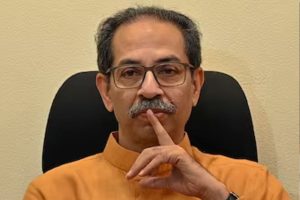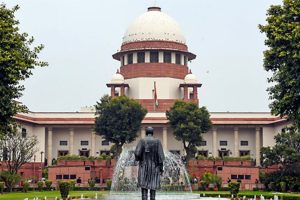The West Bengal government has sanctioned Rs 1 crore to the West Bengal National University of Juridical Sciences (WBNUJS) to honour the late Justice Radha Binod Pal, the only Indian judge from the Calcutta High Court who participated in the Tokyo Trials. Justice Pal’s landmark dissent at the International Military Tribunal for the Far East, established after World War II to prosecute Japanese leaders for war crimes, remains a celebrated example of upholding fairness, impartiality and legality in international justice.
Speaking at an international conclave titled “Justice Dr Radha Binod Pal and Quest for Justice: Historical Perspective and Contemporary Implications” organised by WBNUJS to commemorate Justice Pal’s legacy, Nirmal Kanti Chakrabarti, vice-chancellor, WBNUJS, highlighted the government’s generous contribution. He announced the establishment of the Radha Binod Pal Chair at the university, with the allocated funds fixed to generate interest for organising activities such as lecture series in his memory. A book compiling research on Justice Pal, to be published by Springer-International Publisher, is also in the works.
Advertisement
Justice Pal’s grandson, Sudhi Binod Pal, expressed gratitude for the honour and urged the state government to rename Beadon Street, where Justice Pal once resided, in his memory. Additionally, he proposed naming a park in New Alipore, near another of his grandfather’s residences, after Justice Pal. He further suggested that the Victoria Memorial Hall preserve artefacts belonging to the iconic jurist.
The conclave brought together legal luminaries, scholars and policymakers to discuss Justice Pal’s legacy and its relevance to contemporary global legal challenges. The distinguished guests included Justices PS Narasimha and Dipankar Datta from the Supreme Court of India, and Justice Soumen Sen of the Calcutta High Court. Professor Mark A Drumbl from Washington and Lee University, joined the discussion, along with other dignitaries, including Consul General Nakagawa Koichi of Japan.
The event featured engaging keynote speeches, panel discussions and academic exchanges that explored themes such as justice, decolonisation and the evolution of international law. Speaking on the occasion, Nirmal Kanti Chakrabarti also highlighted Justice Pal’s fearless commitment to justice and called for renewed academic focus on his ideals.
Supreme Court Justice Dipankar Datta emphasised the importance of dissenting opinions in judicial systems. “Dissenting judgments do not merely highlight flaws or loopholes but provide an alternative perspective on significant matters,” he said, adding that such opinions must remain relevant in a functioning democracy.
The Tokyo trials
In the aftermath of World War II, the Allied powers established the IMTFE (International Military Tribunal of the Far East) to prosecute Japanese leaders accused of war crimes, including crimes against peace, war crimes and crimes against humanity. Convened in Tokyo in 1946, the tribunal was modelled after the Nuremberg Trials but faced criticism for its perceived victors’ justice. The tribunal’s mandate raised vexing questions about the retroactive application of international law, selective justice and the boundaries of state sovereignty.
Amidst this contentious milieu emerged Justice Radha Binod Pal, the sole Indian jurist among the eleven-member bench, who would leave an indelible imprint on the proceedings with his cogent and unflinching dissenting opinion.
Justice Pal’s dissension: A legal and moral stand
Justice Pal’s dissent, articulated in his 1,235-page judgment, was a masterclass in legal reasoning and moral courage. Unlike his contemporaries, who predominantly affirmed the guilt of the accused, Pal held that the trial itself was fundamentally flawed. His dissent was predicated on three principal arguments:
Ex-post facto legislation: Pal contended that the tribunal’s reliance on laws formulated post-facto to the alleged crimes contravened foundational legal principles. He underscored that applying retroactive laws undermines the legitimacy of judicial proceedings and erodes the sanctity of the rule of law.
Victors’ justice: Pal astutely critiqued the IMTFE as a manifestation of victor’s justice, observing that the Allied powers themselves were not held to account for comparable acts of aggression and wartime conduct. This selective application of justice, he argued, diminished the tribunal’s moral authority.
The nature of aggression: In an argument that remains jurisprudentially significant, Pal questioned the characterisation of aggression as a prosecutable offense in the absence of a pre-existing international consensus. He emphasised the inherently political nature of such determinations, which risked transforming the tribunal into an instrument of power rather than justice.
Justice Pal’s dissent was met with opprobrium in the immediate aftermath of the trials but has since been hailed as a prescient critique of the inherent limitations of ad hoc international tribunals. His judgment, often overshadowed by the predominant narrative of the trials, underlines the enduring tension between retributive justice and procedural fairness in international law.
Pal’s principled stand has inspired generations of jurists, particularly in the Global South, as an exemplar of intellectual independence in the face of overwhelming consensus. His dissent remains a cornerstone of legal scholarship on transitional justice, post-conflict accountability and the evolution of international criminal law.
The writer is a lawyer, and a journalist on the staff of The Statesman











